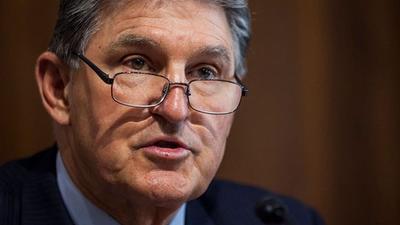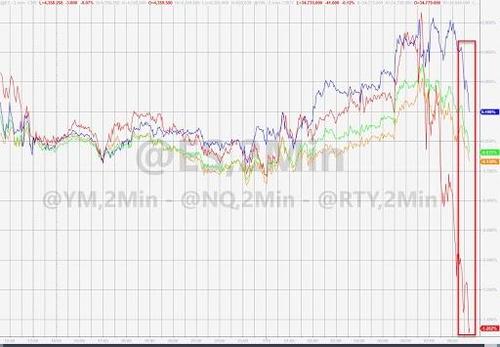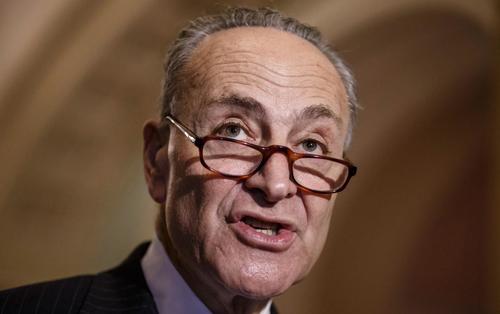
Earlier, WaPo reported that some of the proposed taxes to offset the Biden Administration’s $3.5 trillion “human infrastructure” plan, might have a climate component. Hours, later CNBC, Bloomberg and others are reporting that the plan might include a carbon border tax, essentially a tariff that would apply to “carbon-intensive” imports. The plan would punish countries with weaker climate policies.
As it turns out, Manchin isn’t the only moderate Dem who is still undecided on the $3.5 trillion “human infrastructure” package that Dems are trying to pass using budget rules to push it through on a party-line vote.
Still, to accomplish this, they need all 50 Dems in the Senate on board. Earlier, we reported that Sen. Joe Manchin hadn’t yet given his final sign-off. And apparently, he’s not alone: Bloomberg just reported that Jon Tester of Montana, another Moderate Dem, is not yet on board with the bill.
Following comments from a team of Goldman analysts who warned in a note to clients published this morning that the Democrats’ new spending plan (and the tax hikes they say will accompany it) is a “downside risk to our fiscal assumptions”. Since centrist Democrats likely won’t accept more than $1.5 trillion in additional taxes, “this would likely amount to less than the $3 trillion in additional spending we have been assuming.”
They expanded on their view in five points:
- The outlines of the Senate’s budget resolution have emerged. Senate Majority Leader Schumer has announced that Democrats on the Senate Budget Committee have agreed to a top line spending increase of $3.5 trillion. In a separate comment, Sen. Warner, who sits on the committee, told reporters the resolution would be “fully paid for”, i.e., that it would not increase the deficit.
- If the resolution does not provide for an increase in the deficit, the spending increase might be limited to however much new revenue can be agreed to. The resolution only sets the upper limit on the spending increase that Democrats can pass using the reconciliation process; if a smaller set of tax increases is all that can win support, the spending increase might need to be dialed back. This is an area where the details of the resolution matter and at this point the details are still very unclear.
- It is very unlikely that congressional Democrats will raise taxes by $3.5 trillion over ten years, we believe. Our expectation has been that congressional Democrats might be able to agree on tax increases worth around $1.5 trillion over ten years. This would include a 25% corporate rate and a 28% long-term capital gains rate, among other changes.
- This is an opening bid and likely to change. Centrist Democrats like Sen. Manchin and Sinema are not on the Budget Committee and are not part of this agreement. We would expect further changes to the proposed resolution—including a lower spending total—before they sign on. That process will play out over the next few days. Assuming an agreement this week, the Senate Budget Committee could potentially pass the resolution next week, setting up a Senate vote in late July or early August. That would set the stage for the Senate to begin work on the detailed reconciliation bill, which is unlikely to pass until Q4 and possibly not until very late in the year.
- The $579bn bipartisan infrastructure package is not directly related to the emerging budget resolution, but faces similar issues. While a bipartisan group has agreed with the White House to boost spending by $579bn, the policies they propose to pay for the package are unlikely to generate nearly enough in budgetary savings. The most likely outcome, we think, is for the bill’s authors to scale back the spending boost.
Now, the Washington Post is reporting more details from the plan, they more or less confirmed what we said below – namely, that while negotiators have signed off on the package, the leadership still needs to make sure all 50 Democratic senators support the plan.
Senate Democratic negotiators agreed on the framework Tuesday evening but they still must win the endorsement of all 50 members to pass the measure through their chamber in a process known as budget reconciliation
The WaPo report also included some new details about the Democrats’ tax plans, which mostly focus on compliance.
To pay for these changes, Congressional Democrats are pursuing a slew of tax hikes on the rich and corporations, as well as major changes to the IRS to close the “tax gap” — the difference between what taxpayers owe and what they pay. Other major new sources of revenue include raising the top marginal tax rate, increasing the corporate tax rate, and changes to the international tax system, among other potential measures, the people said.
The specifics of these programs are expected to be written by Democratic lawmakers on the Senate Finance Committee and House Ways and Means Committee. Lawmakers extensively discussed including new bank reporting requirements, the four people said, which would require major financial institutions to send reams of data to the IRS to help the tax agency identify tax evasion and fraud. But it was unclear if that would be included in the agreement.
Some Congressional Democrats believe stepping up IRS enforcement help collect as much as $1 trillion in uncollected taxes, although many tax experts are skeptical about the extent of savings that would materialize from the plan. The IRS changes were pushed in negotiations by Sen. Mark R. Warner (D-Va.), two of the people said. Warner told reporters on Tuesday the package would be paid for.
There have also been whispers that capital gains tax hikes might also be in play. Perhaps that’s why stocks slipped ahead of Powell’s testimony.
The Democratic Congressional leadership celebrated their ‘victory’ in striking an intra-party deal to try and pass a $3.5 trillion “human infrastructure” bill last night, but Sen. Joe Manchin made clear on Wednesday morning that while the deal has won the support of the leadership and the Democrats’ progressive left flank, it’s not exactly a done deal – since Manchin hasn’t actually read the thing yet.
Speaking to reporters in the Capitol on Wednesday, the West Virginia Sen. and critical swing vote said he’s open to the deal, which would be entirely paid for by tax hike offsets.
Notice, according to the quote below, Manchin merely stated that he’s “open” to the deal – not exactly a ringing endorsement. It’s just the latest example of eager Democratic leaders jumping the gun to try and please their party’s new ‘leader’, President Biden. It’s becoming increasingly clear that the leadership hasn’t quite finished whipping the votes.
“I heard about it this morning or late last night from my staff,” Manchin told reporters on Tuesday. “So, we’re anxious to basically review it. They worked hard on it, we want to see it. Also, I’ve been very clear that I want to see the pay-fors and make sure that whatever we do is globally competitive.”
“I’m open to looking at everything they provide. OK? They’re going to have to provide all the information that’s going to be needed,” he added. “They worked hard, they should have a proposal.”
But that didn’t stop media outlets like the Hill from celebrating Manchin’s comment as some kind of commitment, while others pointed out that he has very clearly not yet committed to backing the deal.
According to Manchin, he hasn’t even read it yet.
Months after the Biden Administration and its Congressional allies leaked the first details of President Biden’s massive two-part “Build Back Better” infrastructure plan, Chuck Schumer, the Democrats’ leader in the Senate, just announced that Democrats have united behind a $3.5 trillion “infrastructure” spending package, which they can now pass using special budget rules allowing them to circumvent the filibuster.
In a late-night announcement Tuesday, Schumer said the Budget Committee had reached an agreement to allot $3.5 trillion for a spending package that would complete President Biden’s infrastructure plan.
“The Budget Committee has come to an agreement,” Sen. Schumer told reporters Tuesday night following a closed-door meeting with Democratic lawmakers.
The deal adds to the $600 billion package of infrastructure measures that Biden has struck with Republicans.
“You add that to that the $600 billion in a bipartisan plan and you get to $4.1 trillion, which is very, very close to what President Biden has asked us for,” Schumer said. “Every major program that President Biden has asked us for is funded in a robust way.”
The package will include such “infrastructure” priorities like expanding Medicare, addressing climate change, expanding childcare (after the administration just approved a new $300 handout for couples with children) and education. The Democrats have famously deemed all this “human infrastructure”, which Republicans have vowed to reject.
Democrats will meet with Biden Wednesday, the majority leader said following the closed-door meeting.
“We are very proud of this plan. We know we have a long road to go. We’re going to get this done for the sake of making average Americans’ lives a whole lot better,” Schumer said
Previously, Schumer has promised to hold votes on both pieces of legislation before the Senate breaks for its August recess, which amounts to a pretty aggressive timeline, especially since some Republicans might rethink their support for the earlier measure now that Democrats are pushing ahead with the bigger multi-trillion-dollar package.
To be clear, the bipartisan deal struck by Biden authorizes a total of $1.2 trillion in spending over eight years. Meanwhile, the budget resolution necessary to pass the Democratic-only bill will require some more maneuvering.
Senate Democrats want to bring the bipartisan infrastructure bill to the floor as soon as next week, though negotiators have warned that is an ambitious pace. Democrats didn’t say on Tuesday night when specifically they would be ready to take the budget resolution to the floor. To pass both the budget resolution and a subsequent $3 to $5-trillion infrastructure bill through the Senate Democrats will need total unity from all 50 of their members. Democrats declined to say on Tuesday night if they had unified support.
Via Zero Hedge




